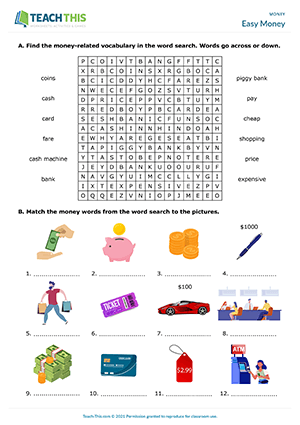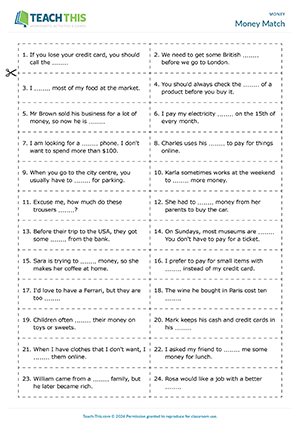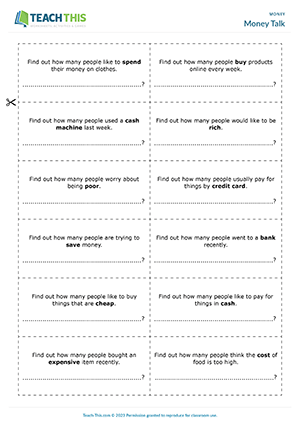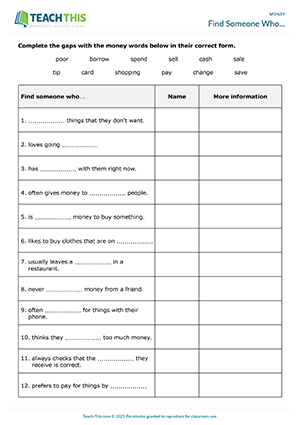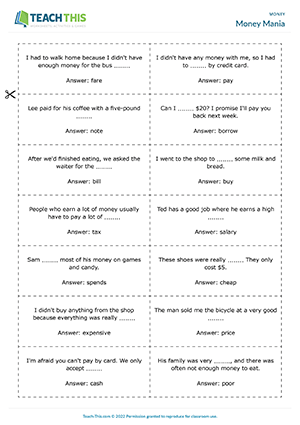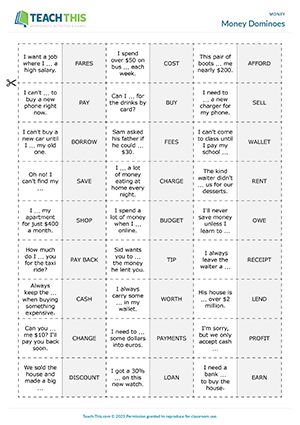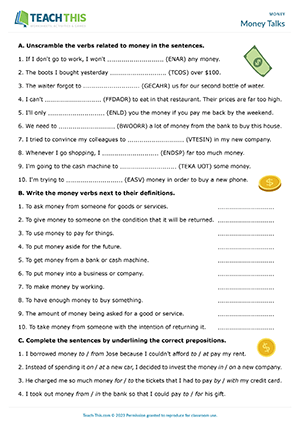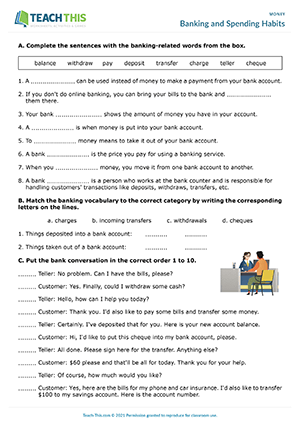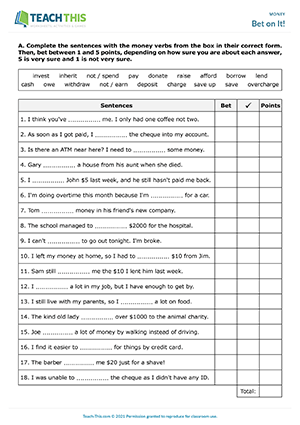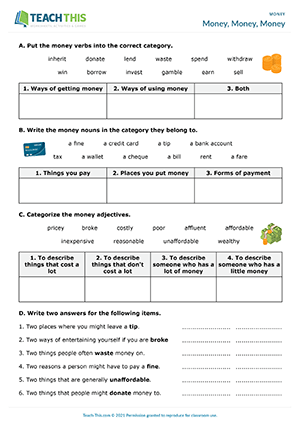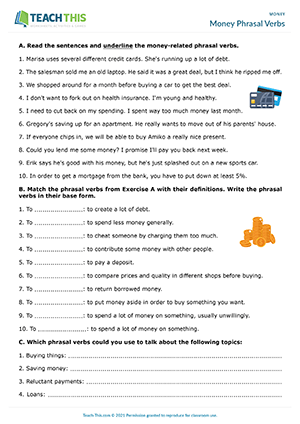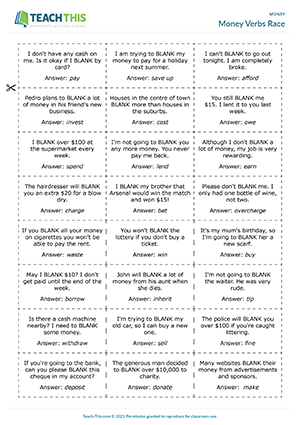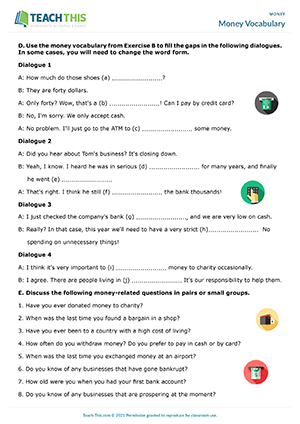This free money vocabulary worksheet helps students learn and practice basic money-related vocabulary. Students begin by finding money vocabulary in a word search. Next, students match the money words from the word search to pictures. Students then unscramble words to form common verbs that are used to talk about money. After that, students complete sentences with the money-related verbs, changing the forms of the verbs as needed. In the last exercise, students read and complete a short story with the money-related words from the worksheet.
Here are two rewarding money games to help students practice common vocabulary related to money. First, students play a gap-fill pelmanism game to practice money vocabulary. In pairs, students take turns turning over one gap-fill sentence card and one money word card. If the money word completes the sentence, the student reads the sentence aloud, keeps the two cards and plays again. If the money word and sentence don't match, the student turns the two cards back over, and it's the other student's turn to play. The student with the most pairs of cards at the end of the game wins. After that, students play a game in which they make sentences using the money vocabulary. In new pairs, students take turns picking up a card and reading the money word to their partner, who has 20 seconds to make a meaningful sentence using the word. If both students agree the sentence is appropriate, the student who made the sentence keeps the card. If not, the card is placed at the bottom of the pile to be used again later. The student with the most cards at the end of the game wins.
In this interesting two-part money activity, students practice money vocabulary by conducting a survey and playing a describing game. First, in groups, each student prepares the yes/no question they need to ask to find out the information on their card, e.g. 'Do you like to spend your money on clothes?' Students then go around their group, asking and answering the questions, keeping a record of who answers yes or no on the back of their card. Afterwards, each student reports their findings to the class, e.g. 'Five people like to spend their money on clothes.' Next, in pairs, students play a describing game using the money vocabulary from the survey. One student picks up a vocabulary card and describes the money word on the card to their partner, who has 20 seconds to guess the word. If their partner is successful, they keep the card. If not, the card is removed from the game. At the end, the student counts how many cards they have. The two students then swap roles and repeat the game. The student who guessed the most correct answers wins.
In this insightful spending habits speaking activity, students ask and answer questions about their spending habits and preferences. First, students complete gaps with the money words shown in their correct form. Next, go through the items on the worksheet and elicit the yes/no money questions the students need to ask in the activity. Students then go around the class asking each other the money questions, e.g. 'Do you sell things that you don't want?' When a classmate answers 'yes' to a question, the student writes down their name and asks a follow-up question to gain more information, noting down the answer in the last column. If a classmate replies 'no', the student repeats the question with another student or asks a different question. When everyone has finished, students give feedback to the class on what they found out.
In this engaging money vocabulary game, students complete sentences with verbs, adjectives and nouns related to money. In pairs, students take it in turns to pick up a card and read the sentence on the card to their partner using the word 'blank' for the missing money word. Their partner then has one chance to guess the missing word by choosing a money verb, adjective or noun from the game board and saying it in its correct form. If the student guesses correctly, they score one point and write the word and point value in the correct column on the game board. If the student guesses the wrong word or gives the wrong word form, no points are awarded for that turn. Play continues until all the cards have been read out and guessed. The student with the most points wins the game.
In this enjoyable money vocabulary game, students play dominoes by completing sentences with words related to money. The first player puts down one of their dominoes on either side of the domino on the table, making sure that the money word completes the gap-fill sentence. The players then take it in turns to complete the money-related sentences by putting their dominoes down at either end of the domino chain. If a player cannot put down one of their dominoes, they take one from the top of the pile and put it down if they can. If there are no dominoes left, play passes to the next student. The first player to get rid of all their dominoes wins the game.
In this useful money vocabulary worksheet, students practice money verbs and other vocabulary associated with money. To start, students complete sentences by unscrambling verbs related to money. Next, students match the money verbs with their definitions. Following that, students underline the correct prepositions in each sentence. Students then move on to complete each sentence with a money verb in its correct form and a money-related noun from a box. After that, students complete money conversation questions using vocabulary from a box. Lastly, students ask and answer the questions with a partner.
In this comprehensive banking vocabulary worksheet, students learn and practice vocabulary related to banking and spending habits. First, students complete sentences with banking vocabulary from a box. Next, students categorize banking vocabulary, according to whether the words relate to things that are deposited or withdrawn from a bank account. After that, students put a bank conversation in the correct order. Following that, students match money-related words with their opposites. Students then read descriptions of people's spending habits and underline the correct words. Finally, students use the vocabulary from the worksheet to discuss money-related questions with a partner.
In this fun money verbs game, students complete sentences with verbs associated with money and then place bets on their answers. To begin, students complete sentences with money verbs from a box in their correct form. Students then bet between one to five points, depending on how sure they are about each answer, five being very sure and one being not at all sure. For each correct answer, students win the amount they bet. For each incorrect answer, students lose the amount. The student with the most points at the end of the game is the winner.
This productive money vocabulary worksheet helps students to learn and practice verbs, nouns and adjectives related to money. To begin, students put money verbs into their correct category: ways of getting money, ways of using money, or both. Next, students write money nouns in the category they belong to: things you pay, places you put money, or forms of payment. Students then move on to categorize money adjectives. After that, students try to think of two possible answers for each money related question and then discuss their answers. Afterwards, students do a gap-fill exercise where they complete sentences with the money verbs, nouns and adjectives from the previous exercises. Lastly, students complete sentences about money with their own ideas using suitable prepositions.
In this free money phrasal verbs worksheet, students learn and practice ten phrasal verbs related to money. Students start by reading sentences and underlining the money-related phrasal verbs. Next, students match the phrasal verbs with their definitions. After that, students write which phrasal verbs they could use to talk about different topics. Next, students do a gap-fill exercise where they complete sentences with money-related phrasal verbs in their correct form. In pairs, students then discuss ten money conversation questions to practice the phrasal verbs and report back their answers to the class. As an extension, have the pairs prepare a short dialogue using the money-related phrasal verbs from the worksheet and given scenario.
In this entertaining money verbs game, students race to complete sentences with verbs related to money. The reader turns over a card and reads the sentence aloud to the players using the word 'blank' for the missing money verb. The players listen and then race to grab the correct money verb card to complete the sentence. The first player to grab the correct verb card from their set and give it to the reader, saying the verb at the same time wins and keeps the two cards. The player with the most cards at the end of the game wins.
This informative money vocabulary worksheet helps students learn and practice common money-related words. To start, students read two texts and underline all the money-related vocabulary. Students then match sentence halves together to form definitions of the money vocabulary. Next, students complete common collocations and phrases by deciding which money word from the worksheet best fits each pair of sentences. After that, students use the money vocabulary items to fill in gaps in mini-dialogues. In the last exercise, students discuss money-related questions in pairs or small groups.
Latest Free
Resources
- Call and Respond
Business - Telephoning (B1)
Date Added: 24th of March
- Small Talk Techniques
Small Talk (B1)
Date Added: 20th of March
- Jigsaw Reading
Reading Exam Preparation (B1)
Date Added: 7th of March
- Writing Jeopardy
Writing Exam Preparation (B1)
Date Added: 6th of March
- Present Perfect Bingo
Present Perfect Yes No Questions (A2)
Date Added: 4th of March
Latest Member
Resources
- Please hold for a moment
Business - Telephoning (B2)
Date Added: 4th of April
- A Day out in Tokyo
Describing Places (A2)
Date Added: 1st of April
- Who Went Where?
Past Simple Wh Questions (A2)
Date Added: 1st of April
- Identifying Bias
Critical Thinking (B2)
Date Added: 31st of March
- Perfect Punctuation
Writing Exam Preparation (B1)
Date Added: 27th of March



